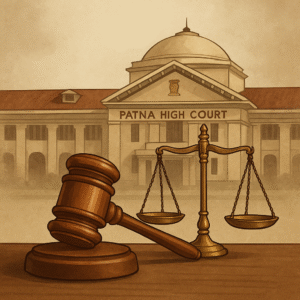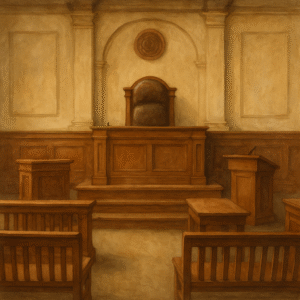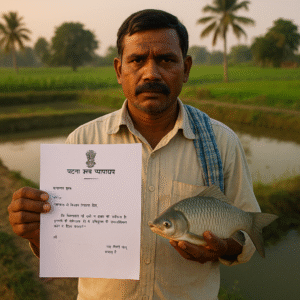Simplified Explanation of the Judgment
The Patna High Court, in Civil Writ Jurisdiction Case No. 7901 of 2021 decided on 7 June 2021, dealt with a case under the Bihar Goods and Services Tax (BGST) Act, 2017 where the taxpayer challenged an ex parte assessment order and the freezing of his bank accounts.
The case was heard by a Bench comprising Hon’ble the Chief Justice Sanjay Karol and Hon’ble Mr. Justice S. Kumar, through video conferencing due to the COVID-19 pandemic.
Background of the Case
The petitioner was a registered dealer under the Bihar GST Act. The Assistant Commissioner of State Taxes, Supaul (Purnea), had passed an order dated 8 March 2020 under Section 73 of the BGST Act, raising a demand and issuing a summary in Form DRC-07. The order was passed ex parte—that is, without the petitioner being given a proper opportunity of hearing. Subsequently, the petitioner’s bank accounts were also attached.
Aggrieved by this, the petitioner approached the High Court, arguing that:
- The order was passed in violation of principles of natural justice.
- No sufficient notice or opportunity to explain his case was granted.
- The order lacked reasoning and justification for determining tax liability.
- The freezing of his bank account was unjustified and disproportionate.
The Revenue Department, represented by the Assistant Solicitor General and State Counsel, argued that the petitioner had an alternative statutory remedy of appeal under the BGST Act, and therefore, the High Court should not entertain the writ petition.
Court’s Reasoning
The Court acknowledged the existence of an appellate remedy but emphasized that the presence of a statutory remedy does not bar judicial review when there is a clear violation of natural justice.
The Bench found that the assessment order was:
- Ex parte in nature, passed without fair opportunity of hearing.
- Devoid of reasoning, as it did not explain how the tax liability was computed.
- In contravention of natural justice principles, leading to civil consequences for the taxpayer.
Because these defects were apparent on the face of the record, the Court held that it was justified in intervening, even though a remedy of appeal was available.
Court’s Directions
On these grounds, the High Court set aside (quashed) the impugned assessment order and the consequential actions, including the attachment of the petitioner’s bank accounts.
The case was disposed of with the following directions:
- Quashing of Order: The ex parte order dated 8 March 2020 and the DRC-07 summary were quashed.
- Deposit Condition: The petitioner stated that 10% of the disputed tax had already been deposited (as a precondition for appeal). The Court directed the petitioner to deposit an additional 10% of the demand within four weeks.
- De-freezing of Bank Accounts: The bank accounts attached by the tax authorities were ordered to be de-freezed immediately.
- Fresh Proceedings: The matter was remitted to the Assessing Officer to pass a fresh order after granting a proper hearing.
- Opportunity of Hearing: The petitioner was directed to appear before the Assessing Officer on 21 July 2021 at 10:30 A.M., preferably through digital mode.
- Timely Disposal: The Assessing Officer was instructed to pass a reasoned order within two months from the date of appearance.
- Right to Challenge: Both parties were given liberty to challenge the fresh order if required.
- Digital Proceedings: The Court encouraged conducting proceedings via digital mode due to the ongoing COVID-19 situation.
The Court clarified that it was not expressing any opinion on the merits of the case and left all factual and legal issues open for reconsideration by the Assessing Officer.
Significance or Implication of the Judgment
This decision underscores an important principle for both taxpayers and tax authorities under GST law:
- Fair hearing is mandatory: Even if a taxpayer defaults in compliance, the assessing officer must provide adequate notice and opportunity before passing any order.
- Orders must contain reasons: A speaking order is essential for transparency and judicial scrutiny.
- Judicial oversight despite alternate remedies: High Courts can intervene when basic procedural fairness is violated, even if appeal mechanisms exist.
- Relief against bank account attachment: Attachment should not be used mechanically; it must be proportionate and justified.
- Promotion of digital justice: The Court’s direction to conduct hearings online reflects a flexible and modern approach in pandemic-era litigation.
For taxpayers, the ruling is a reassurance that procedural fairness cannot be compromised, and that bank account attachments are subject to strict judicial scrutiny.
Legal Issues Decided and the Court’s Decision
- Whether the existence of an appellate remedy bars writ jurisdiction?
- Decision: No. The High Court can interfere when there is a violation of natural justice.
- Whether the ex parte GST order passed without hearing is valid?
- Decision: No. Such an order is void as it violates principles of natural justice.
- Whether bank account attachment can continue after setting aside the order?
- Decision: No. The Court ordered immediate de-freezing of bank accounts.
Judgments Referred by the Court
No specific earlier judgments were cited, but the Court relied on established jurisprudence that “alternative remedy is no bar where natural justice is violated.”
Case Title
Petitioner v. Assistant Commissioner of State Taxes, Supaul & Ors.
Case Number
Civil Writ Jurisdiction Case No. 7901 of 2021
Citation(s)
2021(3) PLJR 2
Coram and Names of Judges
Hon’ble the Chief Justice Sanjay Karol
Hon’ble Mr. Justice S. Kumar
Names of Advocates and who they appeared for
- For the Petitioner: Mr. Gautam Kumar Kejriwal, Advocate; Mr. Alok Kumar Jha, Advocate
- For the Respondents: Dr. K.N. Singh, Additional Solicitor General; Mr. Anshuman Singh, Sr. Standing Counsel, CGST & CX; Mr. Vikash Kumar, SC-11
Link to Judgment
https://patnahighcourt.gov.in/viewjudgment/MTUjNzkwMSMyMDIxIzEjTg==-OYoKWbu9YRQ=
If you found this explanation helpful and wish to stay informed about how legal developments may affect your rights in Bihar, you may consider following Samvida Law Associates for more updates.








